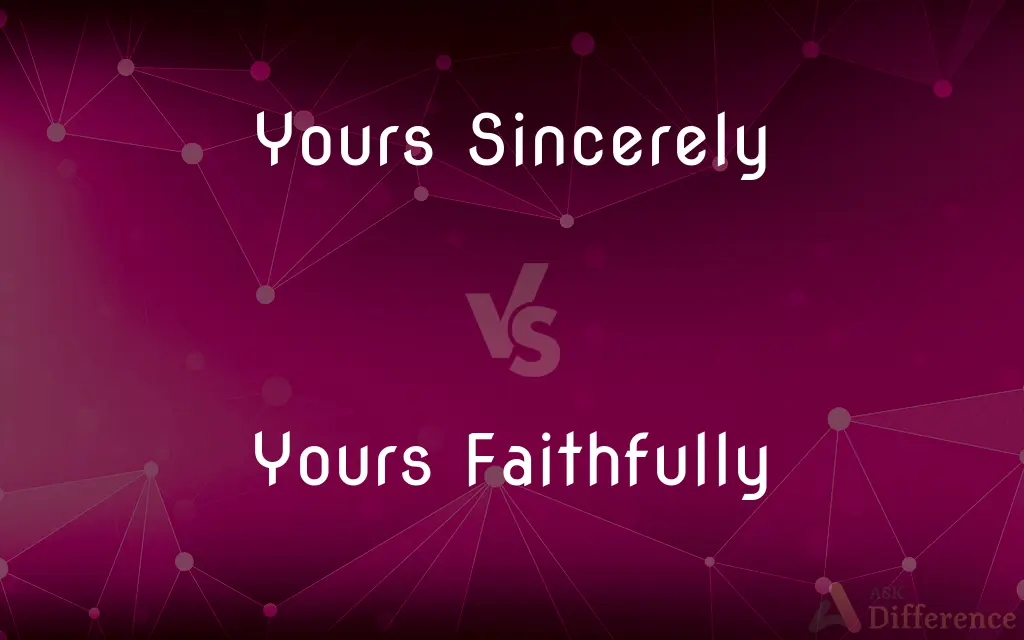Yours Sincerely vs. Yours Faithfully — What's the Difference?
By Tayyaba Rehman & Fiza Rafique — Published on October 21, 2023
"Yours sincerely" is used in letters when the recipient's name is known; "yours faithfully" is used when it isn't.

Difference Between Yours Sincerely and Yours Faithfully
Table of Contents
ADVERTISEMENT
Key Differences
"Yours sincerely" and "yours faithfully" are both conventional ways to close a letter, but their usage is determined by the salutation at the letter's beginning. When the writer knows the recipient's name and uses it in the greeting, such as "Dear Mr. Smith," the closing "yours sincerely" is appropriate. In contrast, "yours faithfully" is more impersonal, used when the letter begins with a generic greeting like "Dear Sir/Madam."
"Yours sincerely" carries a touch of personal acknowledgment because the sender recognizes the recipient by name. By using "yours sincerely," the writer conveys a sense of familiarity and directness. On the other hand, "yours faithfully" denotes a more formal or distant relationship. It suggests that the writer does not have a personal connection with the recipient, hence the generic greeting and sign-off.
In terms of grammar, both "yours sincerely" and "yours faithfully" are correct. However, their application hinges upon the context and the intended level of formality. Furthermore, regional differences exist. In American English, for instance, it's more common to see "sincerely yours" rather than "yours sincerely," and "yours faithfully" is less prevalent.
Another noteworthy point is the evolving nature of language and communication. While traditional letter-writing conventions are still taught and respected, the rise of digital communication has seen a shift towards more informal and varied sign-offs, even in professional settings.
Comparison Chart
Used When
Recipient's name is known.
Recipient's name is unknown.
ADVERTISEMENT
Level of Personalization
Personal, acknowledges recipient by name.
Impersonal, generic.
Common Usage
Formal letters, both business and personal.
Very formal letters, mainly business.
American English Variation
Often "sincerely yours."
Less commonly used.
Implication
Indicates a direct acknowledgment of recipient.
Indicates no personal connection to recipient.
Compare with Definitions
Yours Sincerely
A traditional closing for letters with a named greeting.
Yours sincerely, Mark, hopes for a positive reply.
Yours Faithfully
A conventional ending for very formal letters without a named salutation.
Awaiting your esteemed reply, yours faithfully, Lisa.
Yours Sincerely
A formal yet personalized ending for correspondence.
Wishing you all the best, yours sincerely, Lisa.
Yours Faithfully
An impersonal letter closure, indicating no personal connection.
Thank you for your attention, yours faithfully, Alex.
Yours Sincerely
A letter closure used when the recipient's name is known.
I look forward to your response, yours sincerely, John.
Yours Faithfully
A reserved sign-off mainly for business correspondence when the recipient's name is not used.
With utmost respect, yours faithfully, John.
Yours Sincerely
An ending that conveys familiarity and directness in a letter.
In anticipation of our meeting, yours sincerely, Alex.
Yours Faithfully
A closure used in letters with a generic greeting.
I remain, yours faithfully, Jane.
Yours Sincerely
A sign-off indicating personal acknowledgment of the letter's receiver.
Yours sincerely, Jane, will await your instructions.
Yours Faithfully
A sign-off suggesting a formal or distant relationship with the recipient.
Trusting in your discretion, yours faithfully, Mark.
Common Curiosities
When should I use "yours sincerely"?
Use "yours sincerely" when you know the recipient's name and have addressed them directly.
Are there American variations for these closings?
In American English, "sincerely yours" is more common, and "yours faithfully" is less prevalent.
Is it okay to use "yours faithfully" in personal letters?
It's unusual for personal letters, as it's a more formal and impersonal sign-off.
Can I use other closings besides these two?
Yes, many closings like "best regards" or "kindly" are acceptable, depending on the context.
Can I use "yours sincerely" in a business letter?
Yes, especially when you're addressing the recipient by name.
How do I choose between the two closings?
Base your choice on how you've addressed the recipient at the start of your letter.
Are these terms interchangeable?
No, their usage is determined by the salutation and the level of familiarity with the recipient.
Why are there different closings based on the recipient's name?
It's a convention to distinguish between personalized and generic correspondence.
Can I use "yours faithfully" if I know the recipient's name?
Traditionally, "yours faithfully" is used when the recipient's name is unknown.
Is "yours faithfully" too formal for emails?
It can be, depending on the context. Many prefer more casual sign-offs for emails.
If I start a letter with "To whom it may concern," which closing should I use?
Traditionally, "yours faithfully" would be the appropriate closing.
Are these terms universally understood in all English-speaking countries?
While the terms are widely recognized, regional variations and preferences exist.
Are these terms outdated?
While they're traditional, they're still used in formal correspondence. However, modern communication often uses varied sign-offs.
Is one more polite than the other?
Both are polite; the difference is in the level of personalization and formality.
Can I use "yours sincerely" for all types of letters?
While you can, ensure it fits the context and level of familiarity with the recipient.
Share Your Discovery

Previous Comparison
Poking vs. Scooting
Next Comparison
Miracle vs. WonderAuthor Spotlight
Written by
Tayyaba RehmanTayyaba Rehman is a distinguished writer, currently serving as a primary contributor to askdifference.com. As a researcher in semantics and etymology, Tayyaba's passion for the complexity of languages and their distinctions has found a perfect home on the platform. Tayyaba delves into the intricacies of language, distinguishing between commonly confused words and phrases, thereby providing clarity for readers worldwide.
Co-written by
Fiza RafiqueFiza Rafique is a skilled content writer at AskDifference.com, where she meticulously refines and enhances written pieces. Drawing from her vast editorial expertise, Fiza ensures clarity, accuracy, and precision in every article. Passionate about language, she continually seeks to elevate the quality of content for readers worldwide.














































